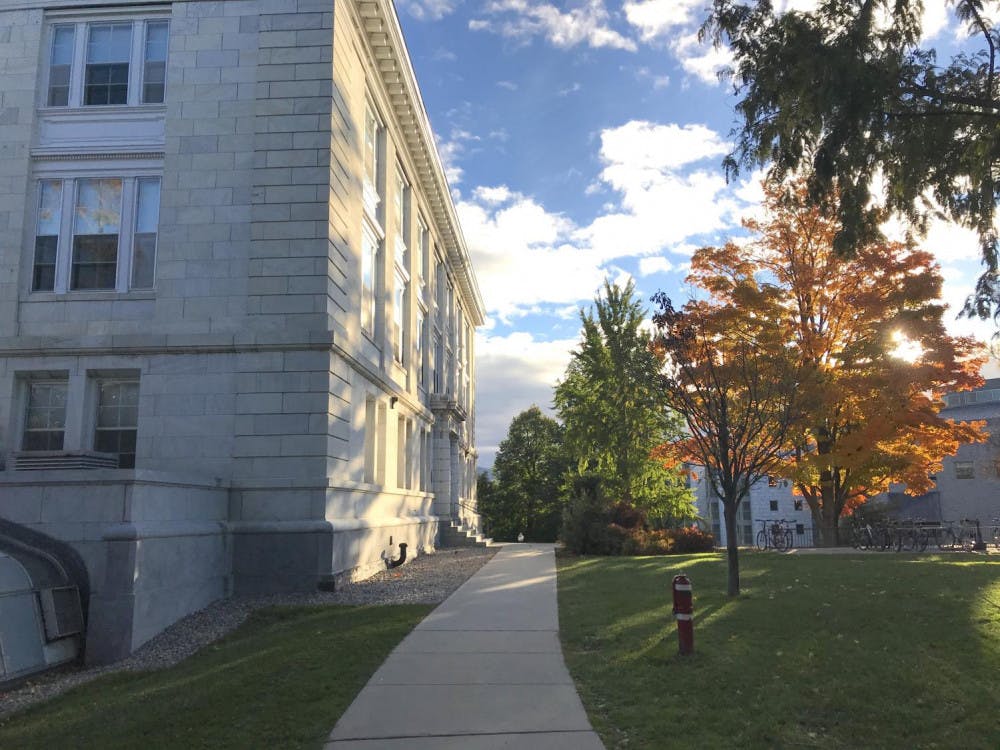Marissel Hernández-Romero, departing visiting assistant professor of Spanish and Portuguese, sent an email to the Middlebury community on Sunday evening describing in detail a series of alleged incidents of racism she experienced in her department and at the institution during her three years as a faculty member.
Hernández-Romero, who is Black and Puerto-Rican, presented a weighty critique of systematic marginalization at the college punctuated with descriptions of allegations involving nine faculty members, all referenced by name.
“I came to Middlebury College in 2017 with a positive attitude, and within a month here, my opinion shifted to survival mode. A sense of powerlessness and marginalization took over my perspective of my place here,” read the email’s opening. “I am an outsider. I was hired, but never accepted, nor welcomed.”
The email was sent to all students, faculty, retired professors and alumni, as well as many administrators, student organizations and other individuals.
Hernández-Romero’s email went on to criticize the institution’s treatment of people of color. She states that the institution ignores and oppresses people of color — expecting them to assimilate into a hostile culture of whiteness and exclusivity without professional or personal support.
Her email frames the college as hypocritical — an institution that claims to advocate for faculty of color while protecting tenured faculty who defend “the continued and uninterrogated comfort of privilege under the guise of ‘free speech.’”
The email opened with a claim that Professor of Political Science Murray Dry made a threatening statement in 2017 directed at non-White faculty and administrators, which she interpreted as meaning that “challenging white privilege will bring worse consequences.” Dry denied this accusation in an email to the Campus, also noting that the meeting in question — centered on racial discrimination — was closed and confidential, therefore limiting his ability to discuss it.
“I would also observe that the statement attributed to me by Professor Hernández-Romero does not reflect my views on this important subject,” Dry wrote in the email . “I am more committed than ever to doing the work necessary to help make Middlebury [a supportive] environment for everyone.”
The remainder of the accused professors teach in Hernández-Romero’s own department. Those allegations vary in severity — from an interpreted racial microaggression from Professor Laura Lesta García to an alleged comment from Professor Patricia Saldrriaga suggesting that Hernández-Romero was an affirmative action hire. Both García and Saldarriaga directed the Campus to the Dean of Faculty when reached for comment.
Another assertion in the email alleges that Associate Professor of Luso-Hispanic Studies Marcos Rohena-Madrazo addressed Hernández-Romero with an offensive term.
“Professor Marcos Rohena called me ‘pendeja’ in front of a candidate, and two other male professors white passing, Enrique García and David Miranda, found it funny and inoffensive,” Hernández-Romero wrote. “When I confronted [Professor] Rohena, and asked if he would call other white female professors in the department such as he firmly said: ‘no, never.’” (“Pendeja” is a Spanish slang term that loosely translates to “dumbass” in English. The letter “a” at the end of the word denotes a female recipient, therefore making this a distinctly gendered term.)
Professors Rohena-Madrazo and García did not respond to a request for comment. Professor Miranda Hardy declined to comment.
Roughly two hours after Hernández-Romero sent the email, the college deleted it from Middlebury servers, removing the message from the inboxes of those who had received it. This retraction was met with outcry from students on social media, who criticized the removal as an action of censorship that violated free speech doctrines.
On Monday afternoon, seventeen hours after the contentious deletion, Chief Officer of Diversity Miguel Fernández sent a “Message of Accountability,” co-signed by Dean of Faculty Sujata Moorti and President Laurie Patton, to the campus community.
“[Hernández-Romero’s] email demonstrates the ways that individual incidents of racism and our inability to respond to such incidents in a way that addressed the underlying climate both reflect and reinforce racism at the systemic level,” Fernández wrote in his email to the community Monday. “We must be accountable for responding to incidents as they arise and for addressing the culture that enables such incidents to occur.”
Notably, Fernández is one of the named faculty members accused in Hernández-Romero’s email. She claims that he was dismissive when she inquired about race-related policy, an allegation he did not comment on in his message to the community. Fernández did not respond to The Campus’ inquiry.
In an email sent to the Campus, Hernández-Romero also alleged that Fernández ignored emails she sent about allegations of harassment regarding Department Chair Mario Higa. When reached for comment about this allegation, Fernández wrote in an email to the Campus that “I have never failed to take any claim of harassment seriously and to follow through appropriately and empathetically. I am fully aware of my obligations and responsibilities.” Higa did not respond to requests for comment.
According to Fernández’s statement to the community, Hernández-Romero’s email was deleted from the college server “in order to prevent an influx of reply-all messages from the thousands of recipients and the additional harm that might have been caused if anyone responded in ways that did attempt to dismiss or make light of her experiences.”
For many students, the acknowledgement came too late. By Monday morning, Dr. Hernández-Romero’s email had been widely circulated on Twitter and Facebook, and was posted on Instagram by accounts such as @dearmidd, @dearpwi, and @blackatmidd. Many individuals took it upon themselves to disseminate it, such as former sophomore SGA senator Paul Flores-Clavel ’22, who forwarded the email to all students. Student organizations such as SNEG, WRMC and JUNTOS followed suit in distributing the email to their registered domain lists.
Joel Machado ’22 composed an email template for students to send to administrators, which demanded both student oversight for the Anti-Racism fund and that the SLG investigate the faculty accused in Dr. Hernández-Romero’s email. “Rest assured knowing that the student body will continue to hold you accountable to the promises that have been made by President Patton,” Machado wrote in reference to Patton’s recent communications on racism within the Middlebury Community.
Monday night’s town hall on the college’s plans for re-opening in September led to conversation about the allegations that had been disclosed the night before. SGA Vice Presidents Roni Lezama ’22 and Sophia Lundberg ’21.5 along with SGA President John Schurer ’21 gave introductory remarks that called for all students to read the email. President Patton later alluded to Dr. Hernández-Romero’s allegations.
“We need to focus on accountability particularly as it relates to systemic racism and in the ways at Middlebury we must be accountable in addressing that racism,” Patton said. “Our policies of due process and confidentiality require that we cannot address this.” She then doubled down on her commitment to intensive fundraising in these areas.
In an email to The Campus sent on Wednesday — two days later — Patton stated that “[t]he deletion of the email in no way reduces our need to confront systemic racism, to diminish the deep pain that racism inflicts on individuals at Middlebury, and to hold public discussions as we work toward changing our institutional culture.”
Middlebury’s general counsel Hannah Ross affirmed that she cannot speak on the allegations, as proceedings under the code of Faculty Misconduct are completely confidential. The faculty misconduct code in question states in Section 3 that, "The principle of presumed innocence applies: until the process of review is complete, the faculty member is presumed innocent." It is unclear if any such review is taking place at this point, as Dean of Faculty Sujata Moorti did not respond when asked for comment.
The only faculty member named in Hernández-Romero’s email who was not the subject of an accusation was History Professor Darién Davis. Hernández-Romero alleged that the administration attempted to impose a harassment claim against Davis — who is Black — from her against her will. “I never had any problem with Darién,” she wrote in an email to the Campus.
She did, however, describe receiving a message from Davis she deemed as inappropriate, but that she did not feel uncomfortable or harassed. She did not further describe the contents of that message. In her communications with the Campus, she repeated that it was Higa, not Davis, against whom she had allegedly attempted to file a harassment claim.
Hernández-Romero is not departing Middlebury earlier than planned, as her visiting professor contract was three years long. She has accepted a tenure track position at an institution in New York that she declined to name. She also declined to provide evidence verifying her claims, although she stated that she has indicatory notes, emails, and witness accounts in her possession.
Hernández-Romero says that in the days since she sent the email, students and some professors from other departments have reached out to show their support. At the time of publication, the administration has yet to contact her.
“A lot of Black, Hispanic, and Latinx students have contacted me to show support and to share with me their experience[s] here at Midd, which are heartbreaking,” Hernández-Romero wrote in her email to The Campus. She noted the uproar that students are making on social media, which has become home to a myriad of calls to action on her behalf.
Hernández-Romero’s own statement to students was circulated on Instagram by Lily Colón ‘21.5, a student in her Socio-Culture of Salsa Music class this semester.
“I urge you all to continue denouncing racism until our institutions and people that run them change,” Hernández-Romero wrote. “I imagine for many of you, your experience may mirror mine, and for that I am sorry.” She then went on to reinforce the messaging in her email, calling upon students to listen and act fearlessly as they continue to move through a world seeped with systemic and institutional racism.
Colón, who has maintained a close relationship with her now-departed professor, fortified the feelings of isolation and hurt that afflicted Hernández-Romero at Middlebury.
“The constant teaching they have to do only to be continually undermined and pushed aside by administration and other students didn’t sit well with her,” Colón said in an email to the Campus, in reference to Black faculty and other professors of color. “Her email shows the ways the school failed her to the point where her hope turned into rage and frustration.”
Colón, who was working on a symposium project with Hernández-Romero and one other student, noted that the three of them met often. “I would like to say the email does not begin to cover the frequency or severity of the abuse she received here,” Colón said.
Hernández-Romero described this rage and frustration as beleaguering throughout her time at Middlebury. She stated that she had already been planning to denounce the racism she experienced when the Luso-Hispanic department released their Black Lives Matter statement last week, which she saw as hypocritical.
Dr. Hernández-Romero concluded her email by imploring all members of the Middlebury community to enact change and hold the institution accountable.
“Create a record of all these events, that are not rumors, but real traumatic experience[s],” Dr. Hernández-Romero wrote. “Make noise. Enough of hiding these events, enough of being off the record.”

Lily Laesch '23 is the Campus’s editorial director.
She previously served as an opinions editor and a layout editor.
Laesch is joint majoring in Geography and Political Science with a minor in History, focusing specifically on foreign policy, border relations, international migration flows, and immigration law.
Outside of the newsroom, Laesch plays on the women’s ultimate frisbee team, dances with RIDDIM World Dance Troupe, and leads outdoor orientation trips.




